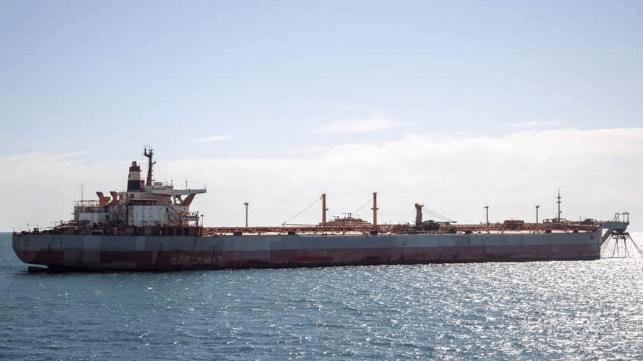Video: UN-Backed Salvage Team Arrives at FSO Safer off Yemen

The team for the UN-backed salvage effort of the decaying offshore oil storage tanker FSO Safer (406,000 dwt) arrived in Yemen today, May 30, to begin the operation that plans to transfer the more than one million barrels of crude oil from the decaying tanker. Boskalis and the team from SMIT reported that they departed Djibouti along with UN representatives on May 29 to begin an operation that has been estimated will take more than seven weeks.
“After two years of political groundwork, fundraising, and UNDP project development, the operation on the water is set to begin!,” David Gressly, United Nations Resident and Humanitarian Coordinator in Yemen Tweeted today. After years of working to reach the agreements necessary for the operation, Gressly was aboard the Boskalis vessel Ndeavor as it arrived at the FSO Safer.
The UN has been leading the difficult negotiations originally proposing to survey the vessel and oversee repairs to the rebels which control that region of Yemen. The earlier agreements to oversee the maintenance and repairs of the vessel which was built in 1976 failed and the UN later reported that it had been determined that the FSO Safer was beyond repair and at imminent risk of leaking, sinking, or possibly exploding because its tanks have not been properly vented in years. Only a skeleton crew with limited resources has been aboard the tanker moored about 4.8 nautical miles off the coast of Yemen.
Excited to be at the site of the #FSOSafer aboard the Ndeavor with the Boskalis/SMIT team. After 2 years of political groundwork, fundraising and UNDP project development, the operation on the water is set to begin! #StopRedSeaSpill pic.twitter.com/uB0GYTufPw
— David Gressly (@DavidGressly) May 30, 2023
The Ndeavor had recently been in Djibouti after passing through the Suez Canal. Joining in the international contributions, Egypt gave the vessel free passage in support of the effort. While in Djibouti, final supplies and a team of approximately 40 salvage experts and support staff boarded the vessel.
The plan calls for the team to immediately begin a visual inspection of the FSO Safer while also taking measurements regarding the level of toxic gas. The ventilation system has reportedly not been operational since 2017. The salvage team will inspect the pumps and engine room, the status of the mooring arrangement, and assess the condition of the estimated 1.4 million barrels of light crude as well as the cargo lines, inert gas lines, valves, and manifolds.
The team is also carrying a portable inert gas generator which they plan to use to begin to stabilize the tanks on the FSO Safer. They expect it will take two weeks during this first phase of the operation and only then will the tanker purchased from Euronav arrive in Yemen. The Nautica (307,000 dwt) is currently waiting in Djibouti.
UN supplied video shows the condition of the vessel as the team arrived today in Yemen
The actual transfer of the oil is expected to take 19 days between the two ships. During the final phase, which will require an additional 17 days, the salvage team will use a mobile spray tank cleaning machine. The residuals and dirty water will also be transferred to the Nautica.
Under the UN plan, the FSO Safer will be sold for green recycling. The UN is continuing the fundraising efforts to pay for the operation, noting that the oil belongs to rebels and can not be used to pay the costs of the transfer.
